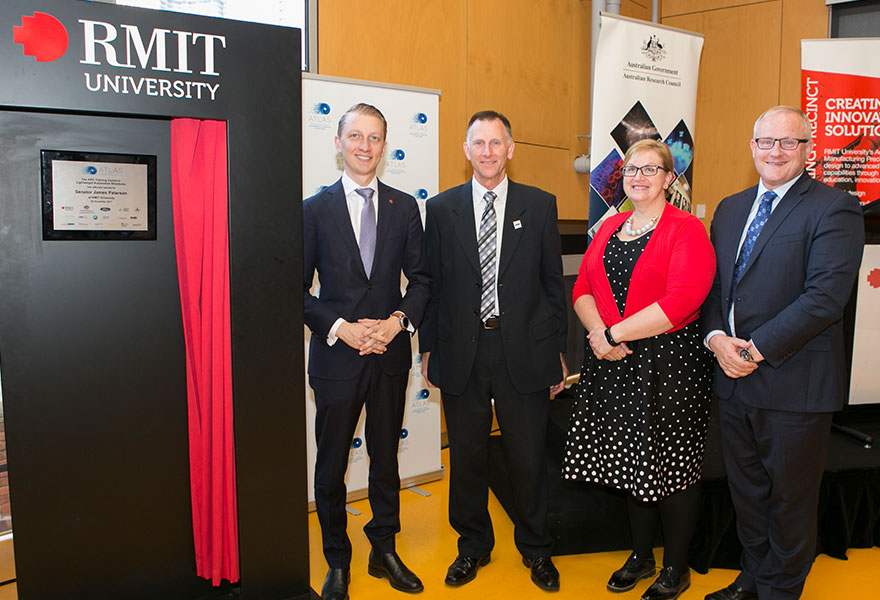The program, called ARC Training Centre in Lightweight Automotive Structures (ATLAS), will be funded by an Australian Research Council (ARC) grant and some of the participants. It will be guided by Professor Stuart Bateman in the RMIT school of engineering and staffed by 13 PhD candidates and five post-doctoral research fellows.
The ATLAS program was launched this week by Senator James Paterson (Liberal, Victoria).
“This is the first ARC Industrial Transformation Training Centre that RMIT has led, and it is truly an exciting area of research,” Senator Paterson said.
“It is pleasing to see that your training centre brings together world-leading scientists and industrial engineers from collaborating organisations within the university sector as well as industry.
“Not only will your industry partner organisations provide substantial cash contributions to the training centre, they will also collaborate with university-based researchers to provide innovative training opportunities for young researchers as they establish their research careers.”
Speaking at the launch function, the chief executive of the ARC, Professor Sue Thomas, said the ATLAS program would also be looking into battery technology.
“The training centre will develop new lightweight technologies, manufacturing processes and energy storage designs that will reduce carbon dioxide emissions in transportation,” she said at the launch.
“Working with industry partnering organisations, the ARC Industrial Transformation Training Centre in Lightweight Automotive Structures will accelerate the transformation of Australia’s automotive industry through new research capabilities and commercialisation of new processes and products.
“This new research training centre brings together world-leading scientists and industrial engineers from 16 organisations from Australia, Germany, United Kingdom, and the United States of America, and will provide an outstanding collaborative network to mentor, train and develop Australia’s next generation of researchers in an industry-focused research training environment.”
Ford Australia will be a lead partner in the ATLAS program, continuing its long association with light-weighting projects in Australia.
“We are incredibly proud of our relationship with RMIT and together we believe that ATLAS will be the basis for an even more integrated local Australian research activity,” said Ford programs director for Asia-Pacific, Dave French.
“We look forward to jointly positioning Ford and this Australian ingenuity right at the leading edge of future Automotive R&D (research and development).”
Ford has been an early supporter of Carbon Revolution, the Geelong-based company that makes one-piece carbon-fibre wheels. Ford fits the wheels to its flagship GT sportscar and the Mustang Shelby GT350R.
Ford also backed an ambitious plan to build a magnesium smelter in Queensland back in 2003, contracting to take 45,000 tonnes of the metal each year after the smelter was built. The project crashed when it proved impossible to scale up the technology.
RMIT deputy vice-chancellor of research and innovation, Professor Calum Drummond, said the ATLAS program was all part of the challenge of innovating and creating jobs for Australians.
“This opens the door to exporting new lightweight automotive product designs, high-value lightweight components, and engineering services to the global automotive market segments,” he said.
“It’s a perfect fit with RMIT’s aim to deliver research with impact that can contribute to a more vibrant and sustainable economy.”
RMIT will lead the program in close partnership with Deakin University and the Australian National University in Canberra. Other educational institutions in the project include Imperial College London, University of Bristol, UK, Michigan Technological University and Friedrich Alexander University Erlangen, Nuremburg.
Deakin already has established a strong position in lightweight materials, having created a centre of excellence in carbon-fibre at its Waurn Ponds campus in Geelong. Carbon Revolution is based at Waurn Ponds and Quickstep Holdings, which makes parts for the Joint Strike Fighter and for automotive clients, also has an operation there.
Partner organisations in ATLAS also include Australian Rollforming Manufacturers, Composite Materials Engineering, Quickstep Automotive, Capral Aluminium Centres, MtM Automotive, the Commonwealth Scientific and Industrial Research Organisation (CSIRO), Data M Sheet Metal Solutions and Shape Corporation.
The ATLAS program looks similar to the co-operative research centre that used to develop new automotive product and technologies. The AutoCRC used to bring together companies with research institutions and academia to develop processes and products that the corporate partners could use.
Under former industry minister Kim Carr, the Australian Automotive Industry Innovation Council commissioned the AutoCRC in 2010 to develop a long-range view, known as the 2020 Roadmap, of where research should be directed.
The Roadmap outlined three general areas for research: vehicle electrification (batteries and powertrains), alternative energy for transport and sustainable automotive manufacturing (lightweight structures and advanced coatings).
By Ian Porter













 Read More: Related articles
Read More: Related articles

